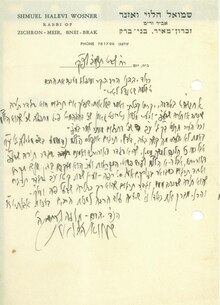Responsa
Responsa(plural ofLatinresponsum,'answer') comprise a body of written decisions and rulings given bylegal scholarsin response to questions addressed to them. In the modern era, the term is used to describe decisions and rulings made by scholars in historicreligious law.
In the Roman Empire
[edit]Roman lawrecognisedresponsa prudentium,i.e., the responses and thoughts ofjurists,as one of the sources ofius scriptum(written law), along with laws originating frommagistrates,from theSenate,or from theemperor.[1]
A particularly well-known and highly influential example of suchresponsawas theDigesta(orDigests), in 90 books, the principal work of the prominent second century juristSalvius Julianus.This was a systematic treatise on civil andpraetorianlaw, consisting of responsa on real and hypothetical cases, cited by many later Roman legal writers.[2]
In the Catholic Church
[edit]In theCatholic Church,responsaare answers of the competent executive authority to specific questions (in Latin,dubia,literally "doubts" ) sent byCatholic bishopsto theHoly See.Responsagiven by thePontifical Council for Legislative Textswhich arepromulgatedas authentic interpretation have the force of law as percanon16 §2 of the1983Code of Canon Law.Otherresponsacannot have this binding force, but nevertheless possess a high authority.[3][4]
Someresponsaare given inNotitiae,[5]the official journal of theCongregation for Divine Worship and the Discipline of the Sacraments(CDW). Theresponsagiven inNotitiaeare, according to the CDW, to be considered only as private responses unless they are published in official legal records of the Holy See.[6][7][8]
In Judaism
[edit]
Inrabbinic literature,theresponsaare known asShe'elot u-Teshuvot(Hebrew:שאלות ותשובות"questions and answers" ), and comprise the body of written decisions and rulings given byposkim( "deciders of Jewish law" ). A modern term, used mainly for questions on theinternet,is "Ask the rabbi".
Judaism's responsa constitute a special class ofrabbinic literature,to be distinguished from thecommentaries(meforshim)—devoted to the exegesis of theHebrew Bible,theMishnah,theTalmud—and fromthe codes of lawwhich delineate the rules for ordinary incidents of life.
The responsa literature covers a period of 1,700 years—the mode, style, and subject matter have changed as a function of the travels of the Jewish people and of the development of other halakhic literature, particularly the codes.
Responsa play a particularly important role inJewish law.The questions forwarded are usually practical, and often concerned with new contingencies for which no provision has been made in thecodes of law,and the responsa thus supplement the codes. They, therefore, function as a source of law, in a manner similar tolegal precedent,in that they are consulted by later decisors (poskim) in their rulings; they are also, in turn, incorporated into subsequentcodes.
In addition to requests for halakhic rulings, many of the questions addressed were theoretical in character, particularly among the earlier responsa. The responsa thus contain rulings onethics,business ethics,thephilosophy of religion,astronomy,mathematics,history,geography,as well as interpretations of passages in theBible,theMishnah,theTalmud,and theMidrash.Thus, while earlyJewish literaturehas few historical works, many notes on thehistory of Judaismhave been introduced into the responsa.
Responsa thus contain valuable information about thecultureof the Jews and the people among whom they lived. Information may also be gleaned about the moral and social relations of the times, occupations, the household,customs,expressions of joy and of sorrow, and recreations, and even games. Older responsa are also important for readings and emendations of theMishnahand theTalmud.
In Islam
[edit]A similar use of responsa (here calledfatwā) is found inIslam.[3]
See also
[edit]References
[edit]- ^"Roman law | Influence, Importance, Principles, & Facts | Britannica".www.britannica.com.Retrieved2021-12-21.
The chief forms of imperial legislation were edicts or proclamations; instructions to subordinates, especially provincial governors; written answers to officials or others who consulted the emperor; and decisions of the emperor sitting as a judge.
The last type of written law was theresponsa prudentium,or answers to legal questions given by learned lawyers to those who consulted them. - ^"Salvius Iulianus" in Adolf Berger,Encyclopedic Dictionary of Roman Law,American Philosophical Society, 1953, p. 552
- ^abBerkmann, Burkhard Josef (2020-09-22)."5. Methods of comparative law of religions - 5.4.1 Example: sources of law".The Internal Law of Religions: Introduction to a Comparative Discipline.Routledge.ISBN978-1-000-17926-2.
- ^Bullivant, Stephen (2016-11-24)."Submitting dubia is a standard part of Church life. It's not unreasonable to expect a clear answer".Catholic Herald.Retrieved2021-12-20.
- ^"Notitiae Responses".notitiae.ipsissima-verba.org.Retrieved2021-12-20.
- ^Pentin, Edward (February 8, 2022)."Traditional Latin Mass: Canonists Question the Legislative Force of Recent Vatican Guidelines".NCR.Retrieved2022-02-10.
- ^"[no title]"(PDF).Notitiae.5:323. 1969.
Solutiones quae proponuntur non induunt vestem officialem, sed habent valorem orientativum: solutiones 'ex officio' publici iuris fient in Acta Apostolicae Sedis
{{cite journal}}:Cite uses generic title (help) - ^"Responsa ad dubia proposita"(PDF).Notitiae.33:138. 1997.
Licet solutiones quae proponuntur potestatem legislativam non habeant, induunt tamen vestem officialem quia actuale magisterium et praxim huius Congregationis exprimunt
External links
[edit]- She'elot U-Teshubot,Jewish Encyclopedia
- Cowley, Arthur Ernest (1911)..Encyclopædia Britannica.Vol. 13 (11th ed.). pp. 169–176.
- The Responsa Project
- Orthodox Responsa Index(in Hebrew).Accessed October 22, 2012
- Ginzberg, Louis(1996).David Golinkin(ed.).The Responsa of Professor Louis Ginzberg.Volume 16 of Moreshet Series: Studies in Jewish History and Thought. New York: Jewish Theological Seminary of America.ISBN9789654560214.OCLC36974955.Excerpts.
- Masorti and Conservative Jewish responsa(in Hebrew).Accessed October 22, 2012
- Topical index of non-binding Reform Jewish responsa
- Ask the Rabbi—The Jewish Responsa
